- Home
- Martin Cruz Smith
Stalin s Ghost Page 4
Stalin s Ghost Read online
Page 4
“Marat.” Isakov shook his head. “Marat, the investigator is only asking questions born of experience. There’s no reason to be taking it personally. He’s not.” He asked as if making sure, “You’re not taking this personally are you, Renko?”
“No.”
Isakov didn’t smile, but he did seem amused. “Now, Renko, you’ll have to excuse us if we work our own case our own way. Is there anything else you want to know?”
“Why were you so certain the glass held vodka? Did you just assume it?”
There was still some in the glass. Urman dipped his first and middle fingers and licked them. He dipped the fingers a second time and offered them to Arkady. “You can suck them if you want.”
Arkady ignored Urman and asked Isakov, “So you’re satisfied what you have here is an ordinary domestic homicide due to vodka, snow and cabin fever?”
“And love,” Isakov said. “The wife says she loved him. Most dangerous words in the world.”
“So you think love leads to murder,” Arkady said.
“Let’s hope not.”
Snow packed on the windshield. At five minutes before the Metro doors opened, Arkady didn’t have time to stop and brush the wipers clear, but he decided that as long as he followed taillights he was on the right side of the road and headed into Three Stations, as everyone called Komsomol Square for the railroad stations gathered there. Traffic lights swung, lenses packed with red and green snow. Leningrad Station’s Italian pomp, Yaroslavsky Station’s golden crown, Kazan Station’s oriental gate: the windshield wipers smeared them together.
Arkady left his car in a snow drift in front of Kazan Station. A few passengers had already come out to search for taxis. Most arrivals streamed next door toward the Metro: oilmen from the Urals, businessmen from Kazan, a ballet troupe returning home, day trippers with caviar to trade, families with small children and huge suitcases, commuters and budget tourists following a dim path of half-smothered streetlamps. They hurried in the steam of their breath, hats pulled low, bags and packages tightly clutched, perhaps more eager to leave than arrive someplace else. Snow had driven away the usual pimps and Gypsies and wholesome country women who sold their poisonous homemade brew and drunks who gathered empty vodka bottles to pay for new. A hazardous undertaking. The year before, five bottle scavengers had their throats slit in and around Three Stations. For bottles. Until the Metro doors opened, people would be pressed against a dead end in the dark. There were militia officers assigned to outdoor posts; they were inside the train station checking tickets and fighting Chechen terrorism where it was warm.
Part of Arkady was back in the Kuznetsovs’ bloody apartment, where he and Isakov seemed to have exercised a gentlemen’s agreement not to mention Eva. No, neither of them took things personally.
Arkady searched between shuttered kiosks and flushed out a pair of drunks so unsteady they couldn’t stand except against a wall.
“Stay together!” he told people. Present a solid front, even yaks knew that much, he thought.
But it was each for his own. People closest to the Metro doors clung to their position; those behind pressed harder to the fore, while the crowd further back began to scatter. It was like watching wolves cull a herd as boys flowed out of the dark in packs of five or six, wearing black garbage bags and balaclavas that made them virtually invisible. Old people they plucked where they stood. Bigger game they swarmed; a monk was pulled down on the ice by his cassock and stripped of his gilded cross. One moment he had two boys in his grasp, and then nothing but trash bags.
Arkady was circled by boys. The leader wasn’t more than fifteen, not afraid to show his moon face and wispy mustache. He pulled up his bag to produce a slim revolver he aimed at Arkady. Arkady was not amazed that a kid could get a firearm. Railroad police, the lowest level of law enforcement, were still issued hundred-year-old revolvers. Had Georgy come upon a drunken guard sleeping in a boxcar and stripped him of his gun? At Three Stations stranger things had happened.
“Bang,” the boy said.
Melting snow coursed down Arkady’s back.
“Hello, Georgy,” Arkady said.
“How would you like a hole in the head?” Georgy asked.
“Not especially. Where did you find that?”
“It’s mine.”
“It’s a real antique. It outlasted the Soviet Union.”
“It still works.”
“Where’s Zhenya?”
“I could blow your brains out.”
“He could,” said the smallest boy in the circle. “He practices on rats.”
“Isn’t that what you are?” Georgy asked Arkady. “Aren’t you a rat?”
After two days without sleep anything was possible. The pistol was a Nagant, a double-action, and the hammer was cocked. On the other hand, the trigger demanded a serious squeeze; Georgy wouldn’t fire accidentally. Arkady couldn’t see how many rounds were in the cylinder, but you can’t have everything.
He rolled back the cap of the smaller boy. “Fedya, you’re up early today.”
Georgy prodded Arkady with the gun. “Never mind him.”
“Fedya, I just want to talk to Zhenya.”
“You’re not listening,” Georgy said.
“He plays chess,” Arkady told Fedya. “You should ask him to teach you how to play chess.”
“Shut up!” Georgy said.
Fedya stole a glance at the dark of a doorway, where a foot stepped back beyond the reach of the light. He felt Zhenya’s gaze and saw the scene from Zhenya’s point of view: the snow-covered battlefield, casualties nursing their dignity and winners dragging off packages like Christmas presents.
A chorus of police whistles promised that authority was on its way. The militia had clubs but, in the dark, who could tell whom to beat? They did their best. Meanwhile, the boys disappeared, not so much retreating as dissolving into shadows. Georgy backed off, the gun still pointed at Arkady, who watched the boys gather and slip away.
“Zhenya!”
Georgy’s group slipped between trash bins, climbed a chain-link fence, and in a moment were gone in the direction of the railroad yard, a confusing array of sidetracks and trains on any night and now a white maze. Arkady followed their prints through the snow until all the footsteps went in separate directions and left him spinning.
Arkady retreated to the station. He staggered into the still atmosphere of the station’s great hall, the suspended breath of the chandeliers, the rows of motionless bodies. As if sleep were the first business of the station, train departures were not announced. Take me to romantic Kazan, Arkady thought, to the land of peacocks and the Golden Horde. He was coughing so hard he dropped his cigarettes. Disgusted, he crumpled the pack and tossed it aside.
As he came out the front of the station he saw—briefly, before snow obscured his view—Georgy and Fedya with a boy that could have been Zhenya crossing the traffic island in the middle of the square. Arkady stumbled down the steps and squeezed between parked cars onto the street. Even blinkered by snow the lights of the square were bright. No trolleys out yet, although overhead cables hummed. By the time Arkady reached the island the three boys were halfway to the opposite sidewalk, but he had caught his breath and was gaining with every step when the blast of a horn brought him up short.
The three turned at the sound.
“Zhenya!”
Arkady retreated out of the way of a snowplow. The machine traveled in a haze of headlights and crystals, snow spewing from the blade. Arkady couldn’t run in front because a second plow followed at an angle, and a third, lumbering and grinding, walling off the sidewalk with snow.
4
A rkady and Eva lay in a gray light that spread through rooms mostly bare of furniture. Arkady had inherited the apartment from his father; it was huge in comparison to his old flat, which they had left because there she felt the presence of Irina. “I won’t compete with a ghost,” she said. A table here, a portable television there were more like claims of res
idence than actuality. Arkady had disposed of all his father’s possessions, any toehold the dead man might retain, except for his books and pictures, which were boxed and sealed in the office closet.
From the outside the building was an architectural collision of Gothic buttresses and Moorish arches, but, inside, the digs were fairly grand, with high prewar ceilings and parquet floors. The apartment house had been built for Party and military elite, who were proud of their address, although during Stalin’s time it was also where the most people were taken away in the middle of the night, not to be seen again for years, if ever. Residents had listened with dread for a knock on the door or even the ascent of an elevator. Rumor claimed that special passages had been built into the walls to accommodate the agents of the state. What Arkady found interesting was that, even knowing the building was a chopping block, no one had dared decline the honor of moving in.
The truck with all their earthly possessions was a week late and they had been living in a makeshift way, their base a mattress they laid directly on the parquet floor. A quilted coverlet spilled off the bed, but Arkady and Eva were warm because the building was a prodigy of heat. They had slept the day away next to a tray crammed with bread, strawberry jam and tea. The wind had died and snow fell in thick, feathery clumps that drifted as shadows down the curtains.
Her body could have been a girl’s, her breasts small and her skin so pale and unlined that he half expected it to carry an imprint of him. With her black hair, she was the perfect creature of dusk. At night when she couldn’t sleep, which was often, she walked around the apartment in a robe and bare feet. Some rooms, like the office, they didn’t use at all, except for storing boxes of photographs of his father and Irina he had brought by car. At night the parquet floor would groan; she preferred sleeping in the daytime, when fewer ghosts were about.
Eva didn’t need his ghosts, she had her own. She had been a schoolgirl in Kiev, marching in the May Day parade four days after the meltdown at the Chernobyl nuclear reactor station because the authorities assured the public that the situation was under control. A hundred thousand children marched into an invisible rain of radioactive plutonium, potassium, strontium, cesium-137. No one in the parade curled up and died on the spot, but she was labeled a survivor, it being generally understood that survivors, especially women, were both barren and contagious.
In Moscow she had found a position at a medical clinic. Eva was good with the younger patients, especially those who couldn’t sleep. She recorded them and sent the tapes to their families. Her portrait, Arkady often thought, could be painted in just black and white, although lately more and more in black alone and with sharper angles.
The further apart they grew, the more the bed was their mutual safe haven. Words were their enemy, the expression of failed hopes. Sex was performed in silence and it was difficult to say how much of their lovemaking was passion and how much the desperate scraping of a dead match.
The phone rang. Neither Arkady nor Eva wanted to connect with reality, so the caller talked to the answering machine.
“Where are you, Renko? We have a situation that has to be dealt with. If just anyone dead popped up on a Metro platform, it could be a hoax. Stalin is different. To use a likeness of Stalin is a clear provocation. Somebody is behind it. Why did you turn off your cell phone? Where the devil are you? Call in!”
“That was Prosecutor Zurin. What was he going on about?” Eva asked.
“Stalin has been seen a couple of times late at night at a Metro station.”
“Stalin in the Metro? Really? Just what does this Metro Stalin do?”
“Not much. He stands on the platform and gives passengers a wave.”
“Doesn’t execute anyone?”
“No, not a single one.”
“What will Zurin do?” Zurin generally bored Eva, but now she hiked herself up on her elbows.
Arkady was encouraged. This was more conversation than they’d had in a week.
“Well, as the prosecutor says, Stalin is different. Stalin is a minefield and there are no good moves. Call anything about Stalin a hoax and Zurin will have superpatriots to deal with. Do nothing and let rumors spread and he’ll have a shrine on his hands. When the tsar’s bones were found, pilgrims showed up the following day. The Metro will be a mob scene and Zurin will go down as the man who brought the Moscow subway system to a stop. Or—Zurin’s third choice—embrace the situation, announce that the sightings are genuine visions and be left high and dry as a raving lunatic if no more sightings occur.”
“And Zurin called you. So he wants to send you into the minefield first.”
“Something like that.”
“But you’re staying here? I didn’t know you were going to be here all day.”
“I am. Did you have other plans?”
“Except you’re always thinking about work, so you’re not really here when you are here.”
“Not all the time.”
“Yes, all the time. Which is good, I suppose, in an investigator. I know when a ghost joins us. I feel the company.” This was a loaded statement, because there were ghosts and there were ghosts. “I suppose you can’t help becoming involved.”
“Actually, it’s better not to get involved.”
“You can do that?”
“I have to. I can’t spend my life brooding on the dead.”
He closed his eyes and saw the man with the cleaver in his neck. The odds were astronomical against a drunken woman’s dispatching her husband with a single, perfect swing of a cleaver between the vertebrae and through the spinal cord, as Isakov and Urman maintained. A woman so drunk she most likely wouldn’t remember anything she said, let alone a confession. However, the blood spatter pattern on the kitchen walls did seem to match the stains on her housedress. The cleaver handle pointed to the victim’s left shoulder, indicating a right-handed attack; she was right-handed. The fact that no neighbors called the militia about the noise of the fight suggested that the husband and wife had gone toe to toe before. Had they argued over who had the dragon? Enough snow, enough vodka, a ready blade? With that combination you didn’t need professional killers.
Either way, Arkady was annoyed at himself for drawing the attention of Isakov and Urman. Asking questions was the last thing he should have done, although it was instructive watching the captain and his eager lieutenant.
“You’re doing it now,” she said.
“Sorry.”
“I know your secret,” she said.
“What’s my secret?”
“In spite of everything, at heart you’re an optimist.” She amended that. “In spite of me, you’re an optimist.”
“We have our moments.”
“I have proof. It’s all on tape.” When Eva and Arkady were first together she would take a pocket-size tape recorder and cassettes to record what they were doing, whether it was a day of skiing or a simple walk, to play back later and laugh at. When was the last time he heard her laugh?
He held her heartbeat in her breast. With her he was always half aroused. If that wasn’t cause for optimism, what was?
Outside the day faded, the sun a bonfire in the snow.
Down on the street, a road crew was attempting the repair of a pothole. Four sturdy women dug while a man supervised and occasionally held a lamp. Each day for a week they had poured steaming asphalt that settled into a widening hole, a daily demonstration of futility.
The phone rang. A sugary Zurin talked to the answering machine this time, apologizing for disturbing Arkady on his day off and hoping that Arkady wasn’t using his machine to avoid calls. “You wouldn’t be as low as that.”
No problem, thought Arkady. He pulled the phone line from the jack, then remembered Zhenya and reconnected.
Eva watched. “You still expect Zhenya to call?”
“He might.”
“He will be fine. He’s a fish in water.”
“It’s cold out.”
“Then he’ll find someplace warm. Are you
sure you saw him?”
“No, but I’m sure he was there. Did he say anything to you?”
“Two words: He’s here. Then he raced out the door.”
Nobody knew how many homeless kids there were in Moscow. Estimates ranged from ten to fifty thousand, in age from four to sixteen. Few were orphans; most were running from alcoholic, abusive families. The kids ate and wore what they could steal or beg. They slept on heating pipes or in unwatched trains. They sniffed glue, bummed cigarettes, sold themselves for sex outside the Bolshoi, and the closest thing to a steady roost was Three Stations. The week before, the militia had collared Zhenya, along with his friends Georgy and Fedya. Zhenya was released to Arkady, but Georgy and Fedya had simply been released for lack of shelter space. The president himself called homeless kids a threat to national security. Now that Georgy had a gun, maybe the president was right.
“Arkasha, open your eyes. Your little Zhenya wins more money playing chess than you earn risking your life. You think he’s like you, a sweet, agreeable soul. He’s not.”
“He’s twelve years old.”
“He’s somewhere between twelve and a hundred years old. Have you seen him play chess?”
“Hundreds of times.”
“He squeezes his opponent like a python, eats him and digests him alive.”
“He’s good.”
“And you are not responsible for him.”
Arkady had looked into adopting Zhenya. However, with no information about his parents, even whether they were dead or alive, legal adoption was out of the question and an arrangement had evolved. Officially, Zhenya was on the rolls of the shelter where Arkady had first met him. In fact, Zhenya slept on the apartment sofa, as if he had happened by and nodded off. Zhenya was Pluto, a dark object detectable more by its effect on the planets than by direct observation.
“Consider me a python.” Arkady slipped into bed.
They ate in bed. Brown bread, mushrooms, pickles, sausage and vodka.
Eva filled his glass. “Last night at the clinic, one of the other doctors, a woman, asked me, ‘Do you know the curse of Russian men? Vodka! Do you know the curse of Russian women? Russian men!’”

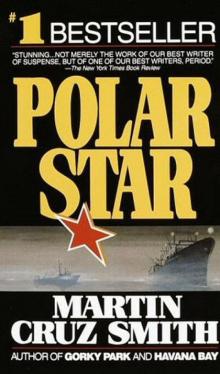 Polar Star
Polar Star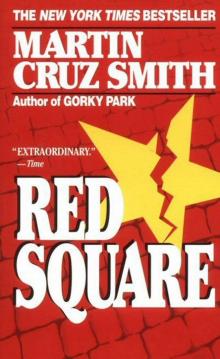 Red Square
Red Square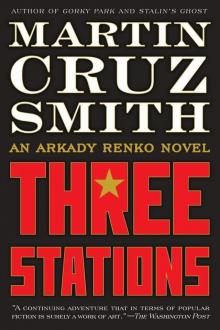 Three Stations
Three Stations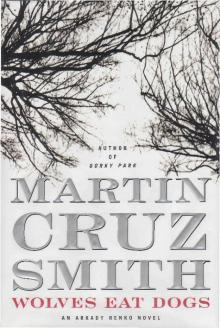 Wolves Eat Dogs
Wolves Eat Dogs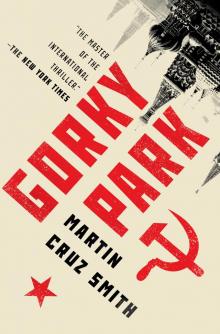 Gorky Park
Gorky Park December 6
December 6 Havana Bay
Havana Bay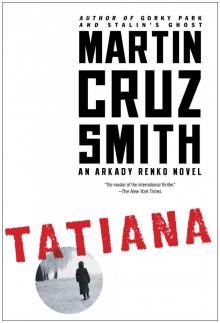 Tatiana
Tatiana The Girl From Venice
The Girl From Venice Stalin's Ghost
Stalin's Ghost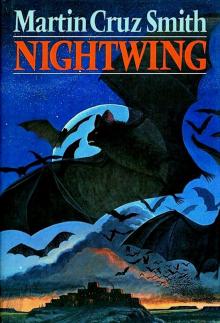 Nightwing
Nightwing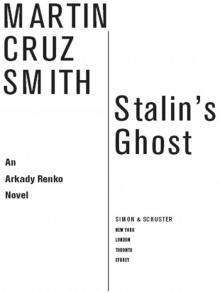 Stalin s Ghost
Stalin s Ghost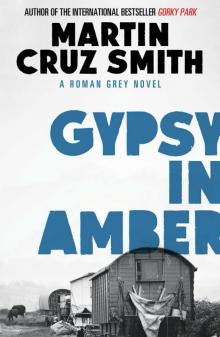 Gypsy in Amber
Gypsy in Amber Rose
Rose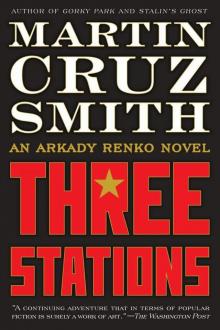 Three Stations: An Arkady Renko Novel
Three Stations: An Arkady Renko Novel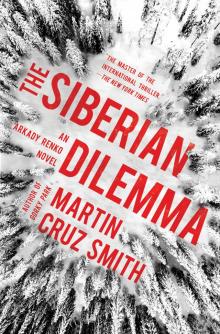 The Siberian Dilemma
The Siberian Dilemma December 6 (V5.0)
December 6 (V5.0)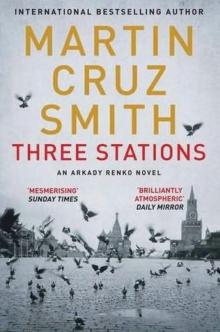 Three Stations ar-7
Three Stations ar-7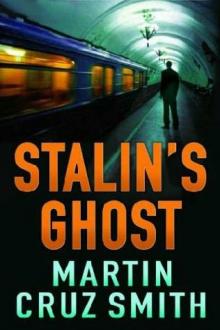 Stalin’s Ghost ar-6
Stalin’s Ghost ar-6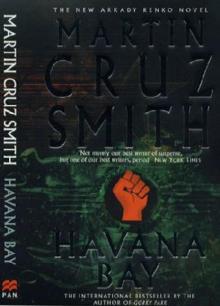 Havana Bay ar-4
Havana Bay ar-4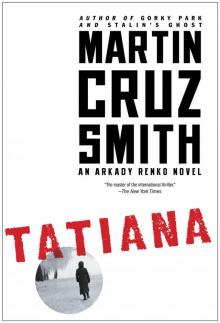 Tatiana ar-8
Tatiana ar-8